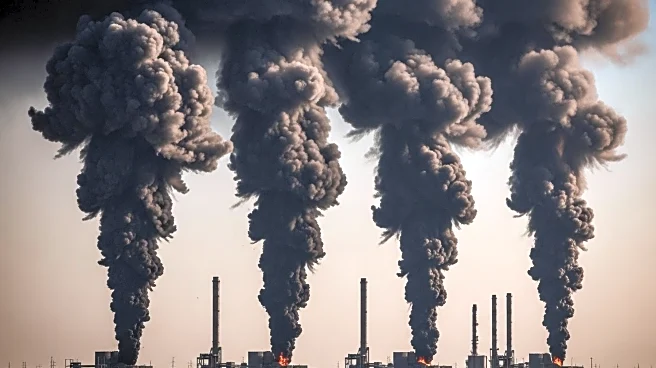What's Happening?
Ukraine's military has confirmed strikes on oil refineries in Russia's Saratov and Samara oblasts, targeting facilities that supply the Russian Armed Forces. The attacks, which occurred overnight on September 20, are part of Ukraine's strategy to undermine Russia's military-economic capabilities. The strikes resulted in explosions and fires, with the final impact still being assessed. These refineries are crucial for producing petroleum products that support Russian military operations. The Saratov refinery, which processes millions of metric tons annually, was hit by drones, causing significant damage. Similarly, the Novokuybyshevsk refinery in Samara Oblast was targeted, leading to a large blaze. These actions are part of Ukraine's broader campaign against Russian oil and gas infrastructure, aiming to weaken Moscow's revenue sources that fund its invasion of Ukraine.
Why It's Important?
The strikes on Russian oil refineries by Ukraine represent a significant escalation in the ongoing conflict, directly impacting Russia's ability to sustain its military operations. By targeting key infrastructure, Ukraine aims to disrupt the logistical support for Russian forces, potentially reducing their operational effectiveness. This strategy could lead to increased pressure on Russia's economy, which is already facing challenges due to international sanctions and the costs of war. The attacks also highlight Ukraine's growing capability to conduct operations deep within Russian territory, which could shift the dynamics of the conflict. For the U.S. and its allies, these developments may influence diplomatic and military support strategies, as they assess the evolving situation and its implications for regional stability.
What's Next?
The ongoing strikes on Russian infrastructure are likely to provoke a response from Moscow, potentially leading to retaliatory actions against Ukrainian targets. Russia may increase its defensive measures around critical facilities and intensify its military operations to counter Ukraine's advances. The international community, including the U.S., will closely monitor these developments, as they could affect global energy markets and geopolitical alliances. Further escalation could lead to increased diplomatic efforts to de-escalate tensions and find a resolution to the conflict. Additionally, Ukraine's continued focus on disrupting Russian supply chains may lead to further innovations in military tactics and technology, influencing future engagements.
Beyond the Headlines
The strategic targeting of oil refineries by Ukraine not only impacts military logistics but also raises ethical and legal questions about the conduct of war. These actions could set precedents for future conflicts, where infrastructure becomes a primary target to weaken adversaries. The environmental consequences of such strikes, including potential oil spills and fires, may also draw attention from international environmental groups. Furthermore, the conflict's spillover effects, such as increased energy prices and economic instability in Europe, could have long-term implications for global markets and international relations.










